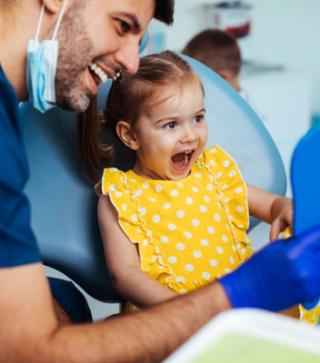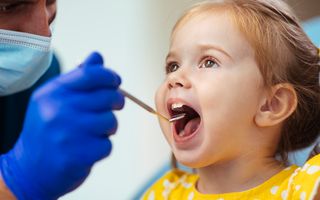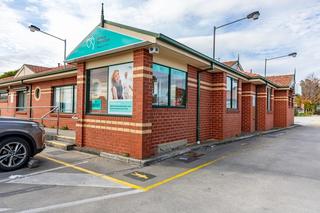Kids Dental
Setting your kids up with great oral hygiene habits for life.

At National Dental Care Thompson Road, we have a strong focus on prevention. We are a family dental practice; 30% of our patients are children, so you can be assured that we have a lot of experience in paediatric dentistry.
It is highly recommended that we start seeing children as early as 2-3 years of age or when all the baby teeth have erupted, so we can help prevent a lot of the problems we see in adults. Our dental team encourages children to develop a positive dental approach which will lead them to a brighter, healthier future. We are devoted to providing a nurturing, caring, and educational atmosphere for children.
It is for this reason that parents in Cranbourne and neighbouring suburbs visit our dental clinic. Ultimately, it’s all about ensuring kids’ dental health and setting them up for life.
What is kids' dental?
Paediatric dentistry, or children’s dentistry, is the services and treatments given to those under the age of 18 for their oral health needs.
By the time your child reaches 2 years of age, you must make an appointment for their first visit with a dentist. There may be some rare circumstances that would warrant a visit to a dental provider before this age, but for most children, this is the age when their official dental care begins.
From there, your child will receive standard dental care as they grow. This includes all of the usual treatments and services you would expect as an adult, including:
- Diagnostic x-rays
- Cleaning and fluoride treatments
- Filling
- Sealants
- Preventive instruction
- Nutritional guidance
In addition to annual check-ups, it’s important to follow recommendations regarding treatments or procedures for dental issues.
How does kids' dental work?
As children grow, their baby teeth will slowly fall out and be replaced by adult teeth. This means there is a lot more change and development than in adult teeth, which is why children need regular check-ups to ensure everything is developing as it should and to treat or avoid problems before they arise.
Common issues with children’s oral health are:
- Tooth decay
- Cavities
- Damage to teeth as a result of accidents
- Thumb sucking/pacifier sucking
- Bad breath
- Gum disease
- Tooth grinding
Young children under the age of five will likely only need visual check-ups and basic cleanings. After the age of five, your dentist will likely suggest moving to x-ray check-ups to keep a better eye on teeth developing under the gum line.
During this time, your dentist will also work with you to encourage good dental hygiene habits at home, including tips and tricks to get your little ones to brush and floss.

Advantages of children’s dentistry
Looking after our children’s health is vital, and their oral health is a big part of that. Here are a few key advantages of paediatric dentistry:
- Maintain good oral health during childhood: Dental pain can be rough, especially for young kids, which is why avoiding issues with regular check-ups and good dental hygiene habits is a good way to ensure great oral health during childhood.
- Set up good habits for life: Taking your child to regular dental visits and teaching them the importance of dental hygiene will help to set them up with good habits and dental health for life.
- Avoid dental problems as an adult: Poor dental health as a child can lead to issues with teeth and gums throughout life, leading to discomfort and expensive treatments during adulthood. Preventative children’s dentistry and a solid, healthy foundation can help to avoid these problems down the track.
- Avoid dental fear: By starting dental visits early, you may be able to avoid the fear that some children (and plenty of adults) have of dentists and dentistry.
How much does kids' dental cost?
The cost of a standard children’s check-up will vary in price just as adult treatments do. If you go to a specialist paediatric dentist rather than a standard dentist who offers children’s dentistry, you may be charged extra.
For children who are eligible for Medicare, and receive at least one additional benefit, they may be eligible for CDBS. CDBS benefits and payments can be used to pay for specified treatments at a private dentist. CDBS provides $1,132 in benefits to be used over two consecutive calendar years, for basic dental services inclusive of dental examinations, x-rays, cleaning, fissure sealing, fillings, and extractions.
If you are eligible for CDBS, you will be able to use your benefits and make an appointment immediately with our team.
What to expect from your child’s dental appointment
Children’s first dental visit should be scheduled around his/her first birthday. The most important part of the visit is getting to know and becoming comfortable with our practice, dentists, and staff.
A pleasant, comfortable first visit builds trust and helps put your child at ease during future dental visits. On your next visit to our practice, allow your child to sit on your lap while you are having your teeth cleaned.Here’s what you can generally expect:
- The dentist will introduce themselves and chat a little to make your child comfortable
- You will be invited to stay in the room with your child
- For younger kids, the appointment will include asking you several questions about their health and habits at home
- The dentist will perform an oral examination
- For children over the age of five, the dentist may take an x-ray
- The visit won’t take much more than 30 minutes
- The dentist will be extra gentle with kids and will explain what’s happening at each point
- If your child gets scared or upset, you can pause the appointment to comfort them and help them calm down
Maintaining your child's dental health at home
It is critical to establish healthy dental habits for your children, including brushing sessions at least twice a day for two minutes each session, as well as flossing when age-appropriate after two years old.

For young babies, use a cloth to clean their gums and when their teeth begin to appear, use a specially designed toothbrush for infants to keep their teeth healthy and clean.
The teeth, bones, and soft tissue of the mouth require a healthy, well-balanced diet. A variety of foods from the five food groups helps minimise cavities and other dental problems. Most snacks that children eat cause cavities, so children should only receive healthy foods like vegetables, low-fat yogurt, and cheeses which promote strong teeth.
Keep in mind that children younger than the age of six will need your assistance to brush their teeth properly. And don't forget to replace toothbrushes every three to four months.
Our goal is to help children develop healthy smiles that will last a lifetime; get in touch with our friendly team and schedule an appointment.
Child dental phobia

Fear of the unknown is understandable. It is a primitive caution that all children have. Whether it be of the dark or of the dentist, helping children to understand what it is they fear is a part of their development.
We have many young children under our dental care. Our friendly dentists have extensive experience with dealing with children of all ages, getting them accustomed to the tools and the chair.
Often, we start with simple procedures to gain the child’s confidence and if further work is required we gradually incorporate that into their treatment based on their comfort in the dental chair.
For the few children that just cannot be treated chair side, the option of having all the dental treatment undertaken under general anaesthesia can be arranged as a day procedure.
Find a time that works for your family
Your child's comfort and healthy smile are our priority, and we know fitting appointments into a busy schedule can be a challenge.
We offer flexible scheduling options to help you find a time that works for your family, so your little one can receive top-quality dental care at a pace that suits them.
Frequently asked questions
Children can begin to see a regular or paediatric dentist from around the age of one, or when their first tooth comes through if that happens sooner. Your dentist will advise you on when to come back for the next appointment, which could be six months or up to a year.
Primary teeth are important for several reasons. Foremost, good teeth allow a child to eat and maintain good nutrition. Healthy teeth allow for clear pronunciation and speech habits. The self-image that healthy teeth give a child is immense. Primary teeth also guide eruption of the permanent teeth.
Some children may be anxious leading up to their dental appointment. You can reassure your child by talking about the visit positively, showing excitement, and talking about why it’s so important for their health.
Generally, your child’s the first tooth appears between six to twelve months old. Gums are sore, tender, and sometimes irritable until the age of three. Rubbing sore gums gently with a clean finger, or a cold, wet cloth helps soothe the gums.
While your baby is teething, it is important to monitor the teeth for signs of baby bottle decay. A bottle containing anything other than water and left in an infant’s mouth while sleeping can cause decay. When awake, saliva washes away the liquid. During sleep, the saliva flow significantly decreases.

